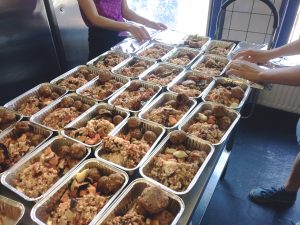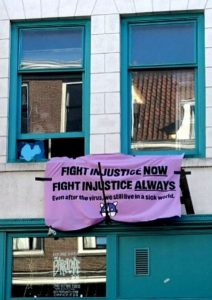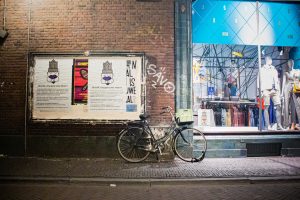The Barricade is a volunteer-run collective inspired by raccoons and anarchism, active as a public library and an anti-foodwaste kitchen. Our* library has a variety of radical left wing books and zines that can be loaned for free. We believe that self-education is a crucial element in the struggle for social change and therefore we aim to provide a space for collective learning. We organize discussions, reading groups and workshops that are free and open to anyone interested. Our vegan dinners are for donation and made out of what would have been otherwise trash. By fighting foodwaste we make it possible for people to eat a decent meal without having to pay a fortune.
* The I of this story is actually a we, collecting the experiences of more people part of The Barricade collective.
It’s March 8th, 7pm.
I’m sitting on a stool at the bar, looking around. Another Barricade Sunday dinner is about to start. The pots and pans are standing on a long table and 40 to 50 people have gathered inside, gradually forming a line in the small bar area. More people will arrive in the next minutes.
I look at the dishes that were prepared, curious to know what people made with all the broccoli we rescued yesterday from the bin. I wasn’t cooking today. This afternoon, the eight people in the kitchen were with a disproportionate number of men. In the venue we were hosting a feminist gathering to take some time to reflect together on the week-end mobilizations for the 8th of March, on the feminist movement – in the Netherlands and in Utrecht – and on how to push forward an anticapitalist decolonial feminist practice in the city.
I walk towards the table with the pots, people in the venue are setting up tables and chairs for the dinner. We are ready to start. We start jamming with our serving spoons on the pans to silence the room.
“Hello everybody, we are the Barricade and we are a collective inspired by raccoons and anarchism!”…the public announcement takes a few minutes, promoting the library and upcoming events, and welcoming everyone to become part of the practice.
I explain what’s coming up next week, we’re screening a documentary on women’s struggle for self-determination in Bakur, Kurdistan: “…the documentary is called Xwebûn, that in Kurmanji means“becoming yourself”, the process of reaching our true selves as individuals who are part of a collective whole. Xwebûn does not just tell the stories of women living in a state-imposed civil war, but shows the resilience of those women, the power of their structures, their strength in resisting and how this is an integral part of the resistance against the fascist state of Turkey”.
Then we start serving. I’m placing some roasted peppers on the plates, while having a chat with the people getting the plate.
Finally, serving is done, I also sit down at a table crammed with the people who were cooking and hosting the event today. We are with fifteen, we eat together…
—
Social reproduction is central to everybody’s survival. Caring of oneself, caring of others under practical but also emotional aspect is central for human life. The capitalist system is highly dependent on this domestic labour; labour that has historically been completely invisibilized and imposed on women inside the household, and that is now partially pushed into the market and its exploitative logics. And while the capitalist production is exactly what makes people sick, and eventually kills them, social reproduction is what keeps people alive.
Dealing with domestic labour at community level, collectivizing social reproductive work, going beyond the constraints of the capitalist system, are the only ways to deal with this labour in a non-oppressive way. Not disguising it as natural ‘feminized’ labour, nor pushing it into dynamics of exploitation – where somebody is getting an often extremely low wage for it and somebody else is making profit out of it – but organizing among a group of people to take care of this work together, as equal individuals practising solidarity among each others. These practices unleash a great transformatory potential, building confidence and capacity among communities to organise themselves in order to meet their own needs. At the same time, they produce some tangible and local ‘victories’ in the everyday struggle people face under capitalism.
—
It’s March 24th, 6pm.
Some people have already queued outside of the space, waiting for the door to open. I am the one handing out the foodboxes today. We just finished, with the other three people in the kitchen, wrapping the last take-away boxes, filled with cooked veggies and potatoes or rice, in aluminium foil. We counted; so far we prepared 70 meals. I’ll probably need some more; I’ll have to call them and tell them to prepare more later.
We’re with two downstairs setting up the take-away station. We place a long table in front of the door opening and hang a transparent, plastic curtain in front of the doorway with hook-and-loop tape. The curtain has a square hole, big enough to fit the wooden hand-out frame, through which we hand out the boxes to the people outside. We sanitise the table and put on rubber gloves. I take the meals from the elevator and place them on the table, the other person opens the door and goes outside, to keep an eye on the queue. One person must always stand outside, that’s what we’ve been told, to make sure that people keep distance and not litter the street with our foodboxes.
We’re ready to serve, and one by one people appear on the other side of the plastic curtain to collect their take-away meal. Some faces are new, some are familiar, and the conversation always goes along the lines of: “Hoeveel maaltijden wilt u?” Twee. “Wilt u daar een vork bij?” Ja, en heeft u ook een tasje? – how many meals, do you need a fork, and yes, they probably want a plastic bag. Occasionally I get a compliment for the food or our efforts to keep the take-away project going.
Until 7pm we serve meals, afterwards we close the door and dismantle the take-away station. The other two people come to the bar area downstairs. We sit at the table and have dinner with the four of us. Where just a couple weeks before 100 people would have been sitting around, there’s now only us.
We look back to what has happened in the last weeks, to how we got here.
To how we decided to close our Barricade Sunday on March 14th, cancelling all the upcoming events. And to what happened afterwards, to how we decided to still find a way to prepare food for people to take away, to how shelters for homeless people stopped serving meals because of the measures against corona and to how, all of a sudden, we found ourselves with the responsibility of feeding these people and, in less than a week, ended up as part of a bigger project to cater for the mess that the gemeente (municipality) left behind.
A bit disheartened by having lost any other practice that is not handing out free food, we keep on making stupid jokes, our laughter echoes in the empty space.

—
Sometimes though, practices of collectivization and solidarity get confused with charity work.
Charity, the action performed by people with more resources that help people with less resources, is very problematic. As a practice, it does not question nor addresses the roots of social injustices. It takes place in the total acceptance of the systemic inequalities – inherently part of the capitalist system – that result in somebody being in the position of needing help and resources and somebody being in the position of giving those without having to engage. Sometimes this hierarchical relationship becomes so explicit, that volunteers of charity institutions start reproducing the policing structures imposed on them, enforcing law and order. Charity is power over — is helping while maintaining a position of power.
Nonetheless, things are more complex than that, and people’s immediate needs can be so enormous, that responding to it has to come first. One is constantly faced with the tension between the urge to address those needs -even as a mere service – and the necessity to still create conflictuality with the existent. The necessity of critiquing the existent, of opposing it, confronting it and building those structures of counter power needed to change it. If this conflictuality is not put in place though, this very much needed effort just results in taking on the job of the institutions.
—
It’s April 5th, 6:30pm
I’m outside today, watching the queue of people picking up the food boxes, nodding “Hi” to them and telling them when the next person can go at the door. We decided to rotate who, among the four of us, goes outside by playing rock-papers-scissors. Nobody seems to enjoy it. I try to smile at people, but it’s hard to build some human connection in the span of seconds and at a distance of 1.5 meters. It’s hard not to think that, had it been the army or the Red Cross, for the people coming to get food, it would have been the same.
A group of neighbours pass by, I overhear them complaining. They already called the cops multiple times, annoyed by the new visitors outside of the building. “Can’t they just go? Isn’t there another place where food could be served?”.
It’s been a couple of times already that we had to serve with two police cars watching from a distance, making sure that the streets of the city centre are kept “clean”. We’ve also been told to make sure that people don’t sit and eat together there in the street. Aggregations are forbidden, and people eating our food next door would just give another reason for further complaints. I can’t help but feeling the absurdity of it all.
I look up to the kitchen on the first floor. Today we hung a banner from the window:
“FIGHT INJUSTICE NOW
FIGHT INJUSTICE ALWAYS
Even after the virus we still live in a sick world”

We wanted to try to challenge the narrative a bit, to make clear to people that injustice is nothing new, that the corona crisis only makes it more visible, and that only fighting for a system that puts people over profit will make it better.
But the city centre is not so crowded these days and also other people in the project are not much interested about pushing for another framing.
Yesterday we also realised that the marketing department of the city came filming while other people were serving.
We look up the video online.
Visit-utrecht.nl
Utrecht Connects, their website introduction reads:
“Creating, starting initiatives, doing sport, together. Even now. In these exceptional times, many initiatives from neighbours, entrepreneurs and organisations are popping up. In this video we bring all this creative, inventive and sometime speechless initiatives together. Utrecht connects. Now more than ever.”
We see in slow motion a box being handed out, a close-up on the smile of a homeless person while an indie song plays in the background.
—
Institutions are often very happy to have people do voluntary labour instead of doing real investments in resources and provision for the people. Many city councils are relying heavily on volunteers to do their jobs for them. This is part of the corrupt system of the welfare state slippage into the third sector. It comes with all the same violence. The concept of ‘participatiesamenleving’ (participatory society / big society), is well known in the Netherlands. As the Dutch government describes it: this means that everyone who has the ability to contribute socially to its surroundings, should take up this responsibility and act upon it. Or, how the critics prefer to frame this concept: ‘figure it out yourself’ governing.
If the government and the municipalities would be gone for good, if people could freely self-organize horizontally without the chains of the capitalist dynamics, that would be great, but in the current system, this sudden responsibility, put on volunteers, is very questionable.
Is this what solidarity and self-organization looks like? Or rather a cover-up, out of emergency, of the damages created by the state and the capitalist dynamics it caters for? Dynamics that are far from being gone in the participatory society, but still imposed on.
—

It’s April 12th, 9pm
Another Sunday, I am sitting on the balcony of the building with the others from the collective after doing the dishes. We are discussing. Yet another attempt at pushing for a different framing around ‘solidarity’, one that actually talks about solidarity, and not charity disguised as such. For now, one thing is clear to all of us: it will have to happen on the street, not on any of the videoplatforms we were chained to these past months. The precise shape we are not yet sure of. For now we have a big piece of paper, some glue, and some paint and brushes, ready to start the experiment.
‘Have you seen these posters they’re hanging everywhere in Utrecht?’ It was started a week ago by a person in the city. From different locations, people could get an A3 poster with a Nijntje (Miffy[1]) image on it. The subtitle said the following: “Utrecht, take good care of each other”. An instagram profile was already made and actively shared pictures of people hanging it behind their windows. Private houses, shops, restaurants, schools, the poster was everywhere. The Utrecht Gemeente was in full support of it. We sigh, in a highly individualist and capitalist city, this is what solidarity looks like.
“Can’t we just reclaim this narrative in a way?”
“If people want to hear about taking good care of each other, wouldn’t it be nice to supply them with an additional text?”
Referring back to the same Nijntje image, we put together what we think taking good care of each other actually means. Once we are good I jot down the following on a big piece of paper:
“Utrecht, take good care of each other?
In these times its crystal clear who is hit the hardest, who is carrying most of the care work and who is struggling to make ends meet.
In order to take care of everybody we need to put people over profit and create a system that’s not based on exploitation.
Let’s make safe and stable housing accessible to all.
Let’s give everybody an income to self-determine themselves.
During and after corona
Care does not mean temporary charity.
Care means demanding social justice.”
Armed with the big piece of paper, a brush and glue, we walk outside.
I hold the poster up while someone else is spreading the glue on a wall just outside the kitchen space.
—
In the end, the state is not only the institutions and their control, but it is also a relationship between people: how they act in respect to each other.
So, it’s not about organizing free social activities, or handing out free food because one has a big heart and wants to help others. In order to radically transform society, to strive for an exploitation-free world, it is essential to start behaving differently towards one other, putting real solidarity and real self-organization in practice. Solidarity should therefore not be intended as mere assistance, as a tool for making up for state’s welfare, but rather as a process of shifting power relations.
[1] Nijntje, or in English ‘Miffy’, is a popular Dutch children’s book figure. The illustrator, Dick Bruna, comes from Utrecht, giving our city a special connection to this children’s book character. For this specific promotional poster on connecting Utrecht, it was therefore the perfect imagery to be used.
